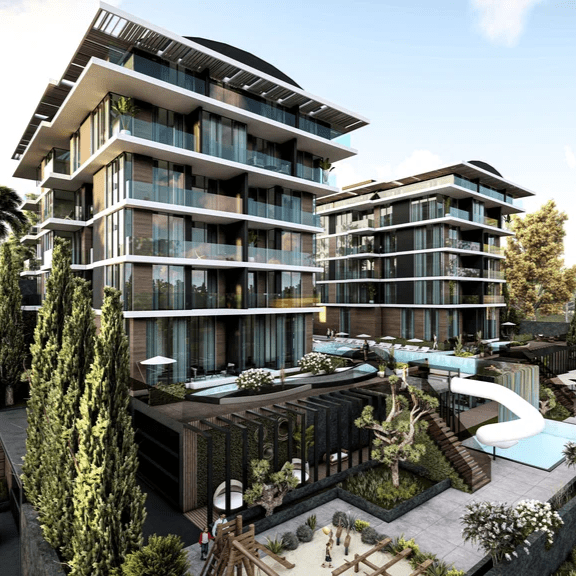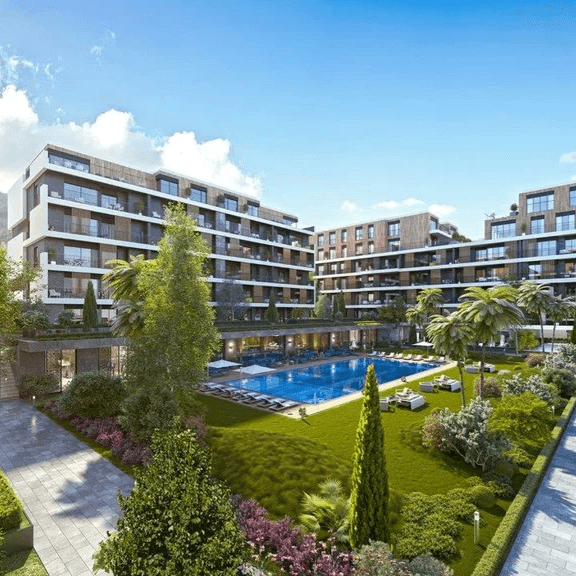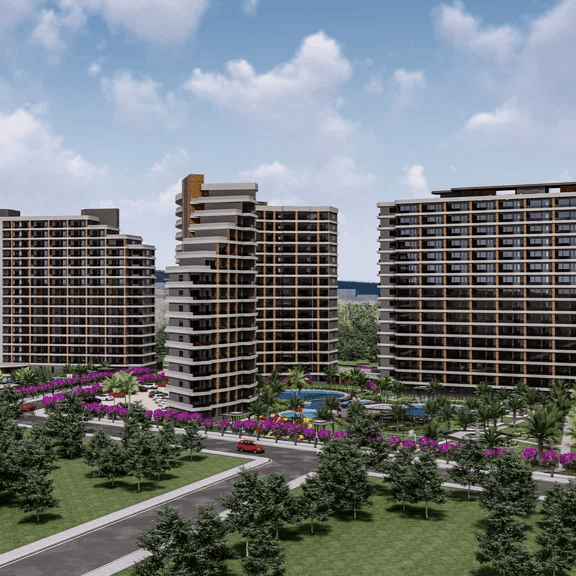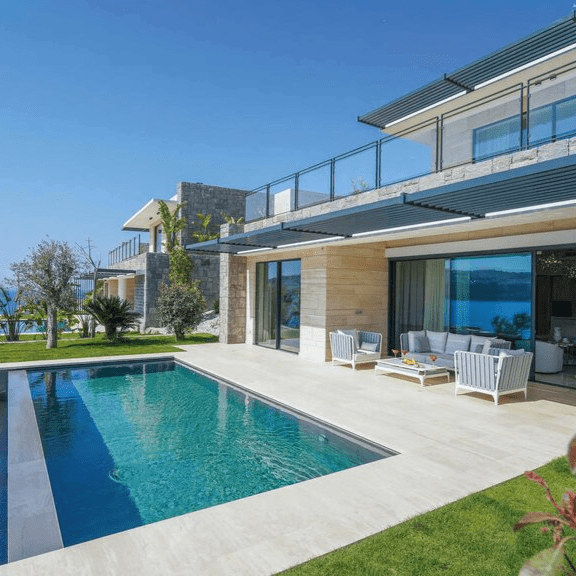How to Buy a House in Turkey and Obtain a Residence Permit: Detailed Guide for Expats
While many foreign buyers are attracted to Turkish residential condominiums with developed internal infrastructure, others prefer detached houses with a barbecue area, terrace, swimming pool and garden where roses bloom and oranges ripen. Moreover, investing a minimum of USD 400,000 in real estate grants a foreigner and their family the right to apply for Turkish citizenship. We have compiled a comprehensive guide on buying property in Turkish destinations which are popular with expats.
First Steps Towards Buying a House
Most expats buy in Istanbul or resort areas, such as Antalya or Mersin, or small towns with clean beaches like Çeşme near the port of Izmir. According to Endeksa, small new townhouses in the resort areas cost a minimum of TRY 6,000,000 (USD 250,000), while the prices of detached houses start at TRY 10,700,000 (USD 400,000).
Mersin. Photo: Branden Leighty (Unsplash)
In 2023, the average price of premium housing in Istanbul reached TRY 13,207,914 (USD 492,940), with a minimum price of TRY 67,200 (USD 2,500) per square metre. Çeşme near Izmir has disclosed similar figures of TRY 13,208,312 (USD 492,954) per property. Furthermore, over the past two years real estate prices here have jumped 322%. Consequently in Turkey, you can buy a modern townhouse, house, or villa for USD 400,000-700,000 in a developed area near the sea coast, which will only go up in value in future.
When selecting a region for real estate investments in Turkey, you should start by checking whether such an investment enables you to obtain a residence permit or ikamet. The Turkish government makes sure that the share of expats does not exceed 20% of the population of each district. Therefore, due to the influx of foreigners, some districts have suspended the issue of residence permits. You can check locations on the government’s website to avoid buying a property in an area only accessible to tourists for short stays.
After selecting a location, you should check the home prices and choose a property. It is advisable to contact a real estate agency or agent fluent in Turkish. In any case, you will require their services to negotiate with the seller and conclude the deal. A specialist will help you understand the different prices for real estate. Make sure that the agent has a valid state licence (it is mandatory in Turkey) and sign an official agreement. Check out the Housearch listings to choose from properties whose sale is accompanied by trusted real estate agencies and agents.
New buildings in Turkey
What to Remember When Buying a Property in Turkey
The Turkish real estate market, including detached housing, has its unique features:
- The size is determined by the number of bedrooms. As a rule, properties in Turkey are described as 3+1 (three bedrooms + one common area) or 2+1 (two bedrooms + one common area). According to Turkish state standards, the area of the real estate in square metres is calculated based on the outer perimeter of the walls. Far from all sellers indicate the internal floor area, which may lead to misunderstandings.
- Residences are often sold with internal finishing, furniture and even tableware, in particular, if this concerns the primary market and premium houses. Property developers sell villas with a designer finish which are fully furnished, including bedlinen, vases and other decor. When selecting a house on the secondary market, ask the seller what items they will leave behind. It is often the case that previous owners only take personal belongings and leave all the furniture, household appliances, tools and equipment. However, this should be discussed in advance and documented.
- The location should be studied just as meticulously as information on the actual property. Coastal cities may consist almost entirely of private houses, but in big cities like Istanbul and Ankara, villas and cottages are often built in remote areas that require you to have a car, as you may not find schools, shops, or pharmacies nearby. Townhouses tend to be built closer to the centre and its amenities, but have little land. It is also worth noting here that cottage complexes are common in Turkey. As such complexes share a swimming pool and a barbecue area between two or three households, they tend to be a little cheaper, but offer less privacy.
- At the stage of the preliminary negotiations, you should learn as much as possible about the engineering systems of the house. New houses use wall-mounted or central air conditioners for heating and cooling. In old properties, this is rare. In summer, they use a fan. In winter, a metal wood stove with a chimney exiting a window. Used less often, gas heating is more cost effective as it always cost more to use electricity to heat a house. If the house has an attic, ask about the material used to cover the roof. Clay tiles and modern sun-blocking materials prevent the roof from overheating. However, in the case of metal covering without proper insulation, spending time on the second floor in summer will be unbearable.
- Old properties are cheaper, but require a meticulous inspection. The quality of construction varies significantly in Turkey. The humid coastal climate can also eventually lead to fungus on the walls. The fungus is not easy to spot, but it is very dangerous for human health. That is why research on the property developer and a real estate appraisal are essential.
To safeguard yourself against possible concerns and oversight when selecting a house, it is advisable to buy from well-known developers who have already implemented high-quality projects.
Selimiye, Marmaris. Photo: zeynep elif ozdemir (Unsplash)
Documents to Check Prior to the Transaction
The good thing about Turkey is that it is easy for a foreigner to buy real estate here. Housing is affordable, and there aren't as many bureaucratic hurdles as, for example, in Germany, France, or other European countries.
However, owing to the lack of coordination between different local departments, a transaction can be registered without some of the necessary documents on the property, simply because the seller decided not to mention them. If this happens, you won’t be able to live in the house. Utilities in Turkey are connected only if all the documents have been drawn up correctly even in the case of purchases of property on the secondary market. First of all, electricity, water, and gas must be disconnected, as well as the internet, while the previous owner's accounts are closed. Then, after the closing of the transaction they are reconnected under the new owner’s name. A seller acting in bad faith can put a house on the market which has still not been commissioned, was built illegally or might have been declared a wreck due to old age and poor earthquake resistance.
Documents also need to be checked because you may be denied citizenship or a temporary residence permit if the transaction was conducted improperly and it tends to be difficult to contest the purchase of property and recover money in court.
This is what you need to do before agreeing to buy a property:
- Ask the seller to provide the technical data sheet (iskan). It contains official information about the structure: the commissioning of the property, the year of construction, the area, and a note on the performance of an earthquake resistance check.
- Check the TAPU (title deed), which indicates the owner and encumbrances, if any. For example, a house may have an outstanding mortgage or be under arrest. In this case, you cannot buy it.
- Sign a preliminary agreement with the seller. It spells out all the terms of the transaction, information about the real estate and its price. This document is usually drawn up by a real estate agency and does not need to be notarised. Only the final agreement needs to be authenticated.
- Order an independent real estate appraisal. In Turkey, real estate has three different values, which can vary significantly. The first is the market value – the price at which the property is being sold. The second is the appraisal value used by the Turkish government when deciding whether to issue a residence permit and citizenship for the investment. Finally, there is the cadastral value used for tax purposes. To qualify for citizenship, an investor must purchase real estate with a cadastral value of at least USD 400,000. In the case of a residence permit, you must buy property worth at least USD 75,000 in a large city or buy one worth at least USD 50,000 in the provinces.
Antalya. Photo: Igor Savelev (Unsplash)
It may transpire that a property was offered for sale for USD 500,000, but was priced at USD 350,000 by the appraiser in the independent appraisal. In this case your application for citizenship will be denied. Given that in 2023 Turkey became a seller’s market where demand for housing was higher than supply, many properties are often overpriced. A real estate appraisal is usually ordered through a real estate agency. It costs from TRY 4,000 (USD 150) and is calculated based on the area of the property.
The owner of the house may insist that you make a deposit. As a rule, it amounts to 10% of the price of the property. The deposit will confirm your intent to buy and guarantee that the property is not sold while the experts conduct the appraisal. While this is standard practice, make sure that the sale and purchase agreement stipulates that the deposit will be reimbursed if the appraisal value of the property is lower than the threshold of USD 400,000.
To assist foreign real estate investors, the General Directorate of the Land Registry launched the website Your Key Turkey. Unfortunately, the English version does not always work. In that case, you can use an online translation to help you translate the text from Turkish. In any case, the directorate’s employees speak English and will be able to help you. You can consult them by email: send scans of documents and ask your questions.
Transaction Stages
A transaction takes one day and is conducted at the Turkish cadastral chamber, Kadastro Müdürlüğü, in the presence of an accredited interpreter. To secure an ikamet or citizenship, we recommend avoiding shared ownership of the residence, for example, between spouses. It is better that one of the spouses acquires the real estate and then acts as a sponsor for the family's residence permit or citizenship applications.
Before closing the transaction, you must:
- Open a bank account and exchange the amount of the cadastral value of the property into TRY. You only need a passport and the required amount — in cash or by wire transfer — to do so. You must obtain a certificate from the bank confirming that you have the required amount in TRY. This is required by the cadastral chamber. The remaining amount of the transaction (the cadastral value is usually lower than the market price) is transferred to the seller without any certificates in TRY, USD, or EUR, as agreed between the parties.
- Arrange for a notarised translation of the passport into Turkish and make a copy. You will also need document-sized photos. Under Turkish law, the cadastral chamber opens a small personal file on each real estate seller and buyer.
- Pay a one-time tax on the purchase of real estate, which equals 4% of the cadastral value of the property.
- Collect all the documents on the property, the agreement, receipt on the payment of taxes, and the personal documents of the buyer and the seller and submit them to the cadastral chamber. The chamber will schedule the transaction date within three-five working days.
The money is transferred to the seller after the signing of the agreement in the presence of an employee of Kadastro Müdürlüğü, an interpreter, and a real estate agent. The same day, the buyer receives the title deed and can contact utility providers to connect the services to the property and apply for citizenship.
Mandatory payments include a 2% commission of the real estate agent. As well as supporting the transaction, Turkish real estate agencies help foreigners settle in the property after the purchase. They supervise the connection of water, electricity and the internet, help with the organisation of repairs or the purchase of additional furniture and appliances.
In a Nutshell
The procedure for buying a house in Turkey for foreigners is simple. However, it is advisable to hire a licensed agent who is proficient Turkish and knows the Turkish market if you want to avoid making mistakes. Before making the purchase, you should make sure that the technical condition of the house is satisfactory and that all the documents are in order. It is also important to arrange for a preliminary appraisal of the property in order to confirm its real value and make sure that it qualifies for the Residence by Investment or Citizenship by Investment programme.
Cover photo: Sarıyer, Istanbul. Tolga Ahmetler (Unsplash)







